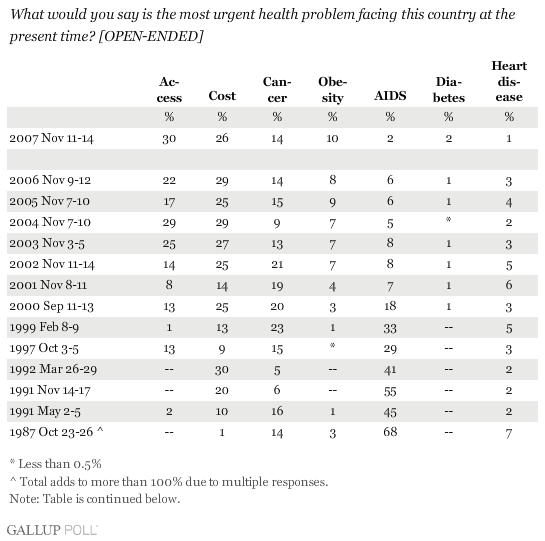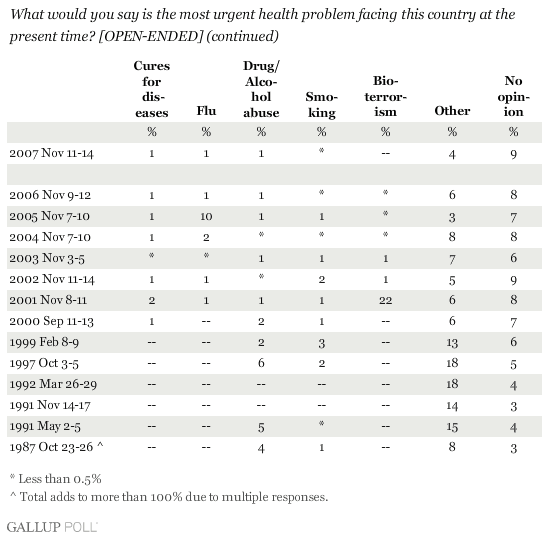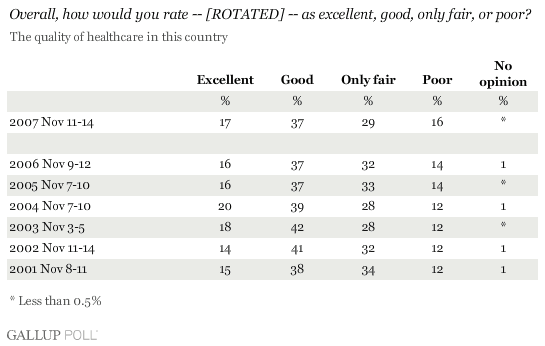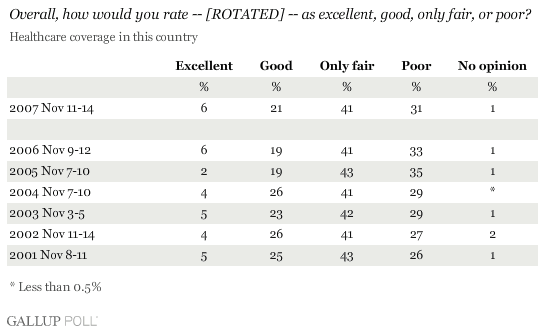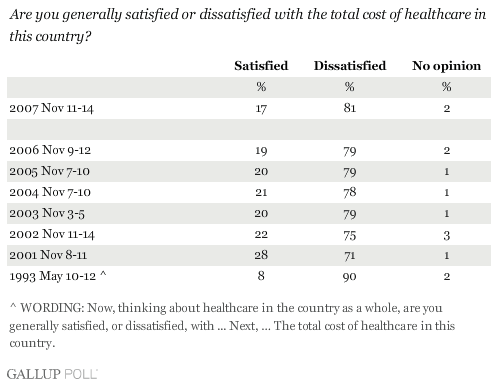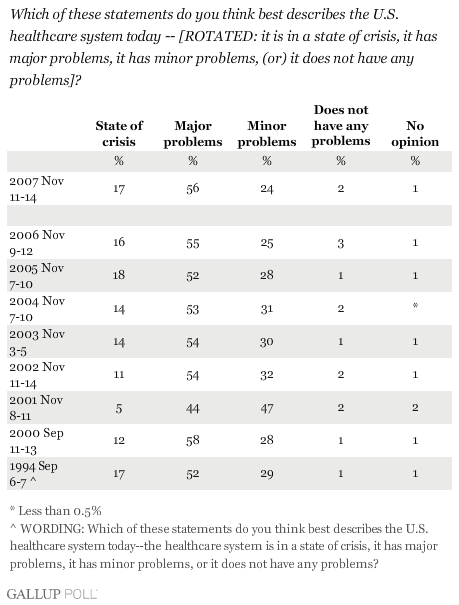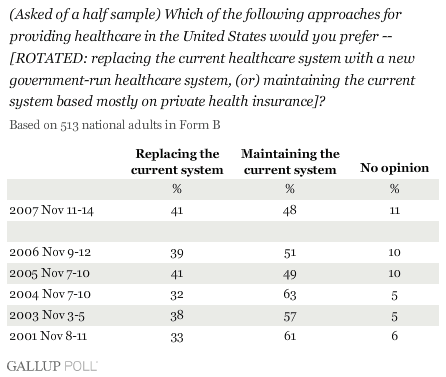PRINCETON, NJ -- Should leaders who want to be responsive to the public's needs and opinions seek a major overhaul of the nation's healthcare system, or only tinker around its edges? People can arrive at different conclusions, depending on whether they focus on Americans' assessments of the national healthcare system, or on Americans' satisfaction with their own healthcare coverage. Gallup's annual Health and Healthcare poll, updated Nov. 11-14, 2007, finds a high level of public concern about the former, but far fewer complaints about the latter.
The new poll reconfirms this perennial duality in healthcare attitudes - that Americans are much more concerned about the healthcare problems "out there" than about the healthcare issues they face in their personal lives. And despite significant political attention to healthcare reform in the 2008 presidential campaign, the poll shows there has been no increase over the past year in Americans' concern about the national healthcare system. It also shows a possible decline in Americans' already modest concerns about their own healthcare coverage.
One useful summary indicator in the new poll is a question that asks Americans to choose between an approach that focuses on fixing the current U.S. healthcare system and one that would replace it with a government-run system. While both positions fall short of attracting a majority of the public, momentum may be on the side of replacing the current system. Support for this approach rose from 32% in 2004 to 41% in 2005, and it remains at that level today.
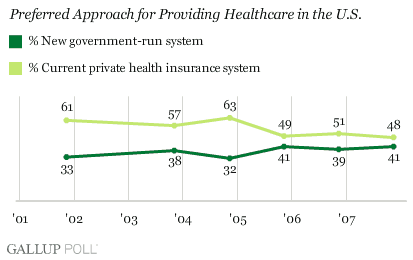
Objective Concern Runs High
Asked to choose among four descriptions of the U.S. healthcare system -- "in a state of crisis," "has major problems," "has minor problems," or "does not have any problems" -- most Americans take a negative view. Nearly three-quarters (73%) say the system is in crisis or has major problems (with the bulk saying major problems), while only 26% discount the issue.
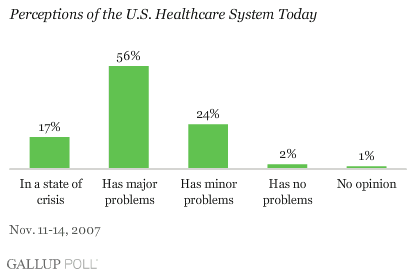
Americans seem particularly concerned about access to healthcare. Only 27% say healthcare coverage in the nation is "excellent" or "good," while 72% describe it as "only fair" or "poor." By contrast, Americans are more positive about the quality of healthcare, with 54% calling it excellent or good and 45% calling it only fair or poor.
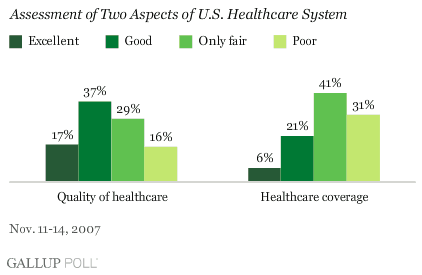
Another area of significant public concern about national healthcare is costs. Eighty-one percent of Americans say they are dissatisfied with the total cost of healthcare in the United States.
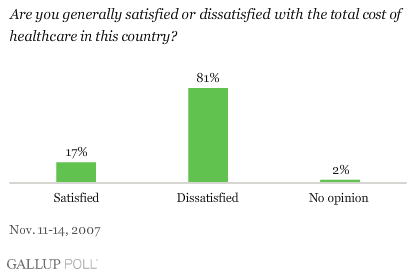
Access and cost also rank as the top answers Americans give when they are asked to name the "most urgent health problem facing this country at the present time." Thirty percent name access and 26% mention cost. The only other issues raised by at least 1% of Americans are addressing obesity, substance abuse, concern about the flu, and finding cures for specific diseases such as cancer and AIDS. Not even 1% name the quality of U.S. healthcare, generally, as the most urgent health problem.
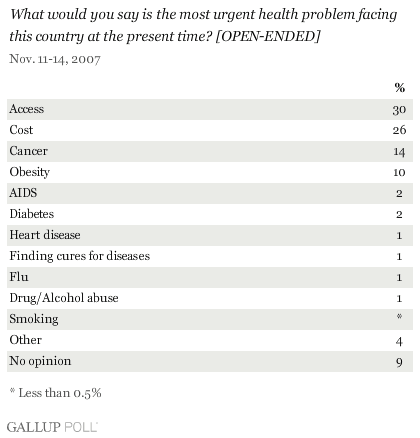
The trends on Gallup's core measures of public satisfaction with the U.S. healthcare system show a slight increase in public dissatisfaction with healthcare costs since 2001, rising from 71% in 2001 to 79% in 2003. It has remained roughly at that level ever since, reaching 81% this year.
The relatively small percentages of Americans in November 2001 saying the U.S. healthcare system was in crisis or had major problems can likely be explained by a change in the public's frame of reference because of the poll's timing, coming only two months after the Sept. 11 terrorist attacks. A September 2000 reading on the same measure found 70% saying the nation's healthcare system was in crisis or had major problems.
The trends on perceived quality of healthcare and U.S. healthcare coverage have been fairly flat from 2001 through today.
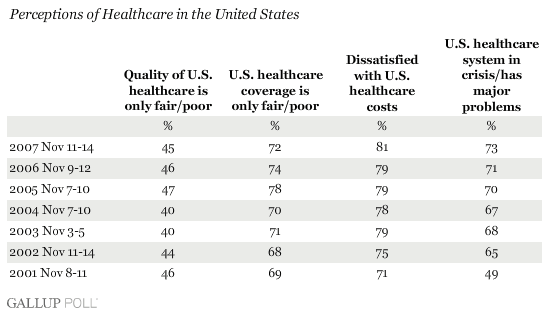
Personally, Americans Are Generally Content
In contrast with significant public concern about national healthcare access and costs, most Americans report that they personally have health insurance coverage, consider their level of coverage to be at least good, and are satisfied with their total healthcare costs.
- Eighty-eight percent of U.S. adults surveyed this month for Gallup's annual Health and Healthcare poll report that they have health insurance coverage, either through private insurance (57%) or Medicare or Medicaid (31%). Eleven percent say they have no insurance, while 1% are unsure. These numbers may understate the actual percentage of the total American population without health insurance because the sampling methods used in telephone polls underrepresent segments of American society at the low end of the socioeconomic spectrum, such as the homeless and those not living in telephone households.
- One in four Americans call their healthcare coverage "excellent" and another 45% call it "good." Only 23% describe it as "only fair" or "poor."
- Fifty-seven percent of Americans say they are satisfied with the total cost they pay for their healthcare; 39% are dissatisfied.
Additionally, the vast majority of Americans are positive about the quality of the healthcare they receive. One-third call it "excellent" and an additional 50% rate it "good." Only 15% call it "only fair" or "poor."
As with trends on national healthcare, Gallup has seen little variation since 2001 in Americans' assessments of their own healthcare. The negative responses that could translate into pressure on elected officials for healthcare reform all fall well below a majority of Americans and, for the most part, even below a third of Americans.
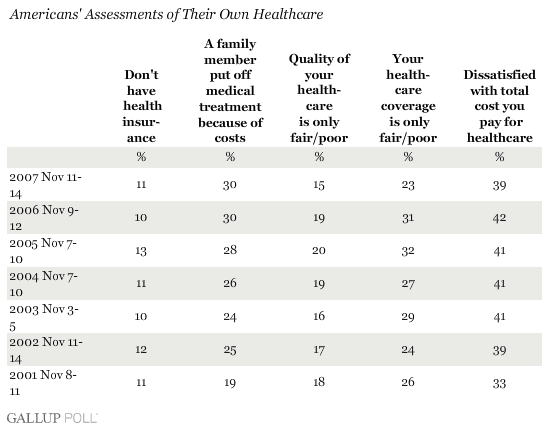
One exception to the general consistency seen in these numbers is the eight-point drop since 2006 (from 31% to 23%) in the percentage of Americans rating their own healthcare coverage as "only fair" or "poor." This is the first time since 2002 that less than a quarter of Americans have rated their healthcare coverage in negative terms. Whether it is temporary or a real shift reflecting improved coverage is unclear.
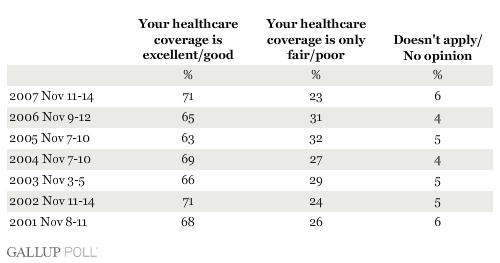
Bottom Line
Previous Gallup polling shows Americans are generally receptive to a number of varied healthcare reform proposals (see "Any Healthcare Reform Plan Will Do for Americans" in Related Items). Americans are clearly sensitive to the failure of the U.S. healthcare system to meet the needs of all Americans. This is also seen in their dissatisfaction with national healthcare coverage and costs, and the pervasive sentiment that the U.S. healthcare system is in crisis or needs major changes. At the same time, most Americans believe the current system is providing good quality healthcare, and they are satisfied with their own healthcare situations. This means that Americans' concern about disruptions to their own healthcare by major changes to the system could emerge as a countervailing force to the otherwise very real pressure for reform.
Survey Methods
Results are based on telephone interviews with 1,014 national adults, aged 18 and older, conducted Nov. 11-14, 2007. For results based on the total sample of national adults, one can say with 95% confidence that the maximum margin of sampling error is ±3 percentage points.
In addition to sampling error, question wording and practical difficulties in conducting surveys can introduce error or bias into the findings of public opinion polls.
